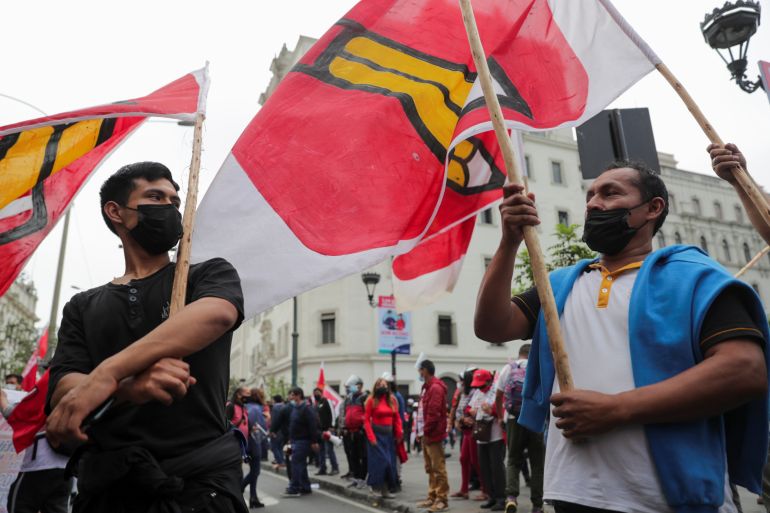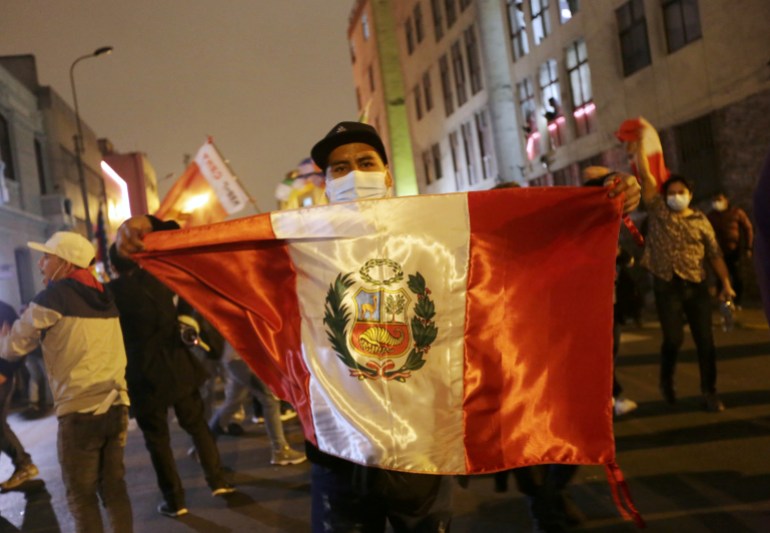Deeply divided Peru awaits final results of presidential vote
Pedro Castillo has thin lead over Keiko Fujimori after what one expert says is ‘one of country’s tightest elections’.

Peruvians are still waiting on the final results of their country’s presidential election, as leftist union leader Pedro Castillo maintains a razor-thin edge over right-wing Keiko Fujimori days after the deeply polarised vote.
With 99.8 percent of the ballots counted on Wednesday afternoon, Castillo had 50.19 percent support compared with Fujimori’s 49.8 percent.
Keep reading
list of 4 itemsPeru’s polarised presidential runoff still too close to call
Peru heads to the polls to elect president in polarised race
Peru on edge as vote counting begins in tight presidential runoff
Sunday’s runoff came amid years of political instability in Peru, which is also struggling to cope with surging COVID-19 infections and deaths and a pandemic-related economic downturn.
Castillo leads by more than 67,000 of the 17.4 million valid votes counted, but with votes still being tallied and ballots being challenged by both sides, it could take days for a final official result to be announced.
The count has slowed as ballots are being sent in from abroad, as well as arriving in the capital, Lima, from Peru’s more remote, rural areas – a stronghold of support for Castillo.
Fujimori, the daughter of former Peruvian President Alberto Fujimori, has raised unsubstantiated allegations that Castillo’s supporters tried to steal votes and her team has flagged plans to raise a legal challenge to the result.
Castillo’s party has strongly denied the claims and electoral observers, including the ONPE electoral body and the Organization of American States, said the vote was carried out cleanly.
On Wednesday, Peru’s military also committed itself in a statement to “respect the will of the people expressed at the ballot box”, as calls circulated on social media for the armed forces to prevent Castillo from taking power.
“In Peru, as in any democracy, electoral results must be respected,” Jose Miguel Vivanco, executive director of the Americas division at Human Rights Watch, tweeted on Wednesday evening.
Vivanco said any fraud allegations must be backed by “serious evidence”, while international human rights law requires that “every vote be counted and respected”.
Hundreds of voters on both sides have taken to the streets to protest for their candidate, mostly peacefully and at times with musicians and dancers.

Both candidates had previously agreed to respect the outcome of the vote.
Whoever wins will take over an economy that has been battered by COVID-19 and the world’s highest coronavirus death rate per capita. Two million Peruvians have lost their jobs during the pandemic and nearly a third now live in poverty, official figures show.
“It’s unlikely that at this point that Fujimori will overtake Castillo,” David Sulmont, a sociology professor at Peru’s Pontifical Catholic University and former head of their polling unit, told the Reuters news agency.
“It is one of the country’s tightest elections,” he added. “The margin may keep varying, but I think Castillo will be the winner.”
Castillo said on Wednesday that party observers considered his triumph a done deal.
“In the name of the Peruvian people,” he thanked “embassies and governments from Latin America and other countries” for messages of congratulations on his “victory”.
No government has officially recognised a Castillo victory, although Bolivia’s former president Evo Morales sent a message of “congratulations for this victory”.